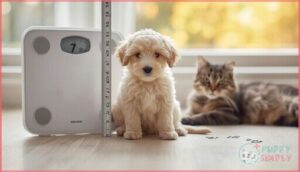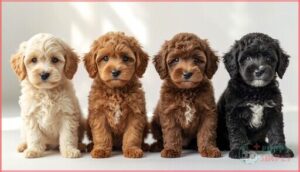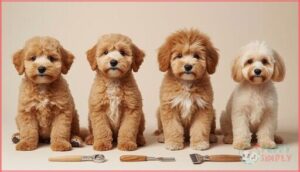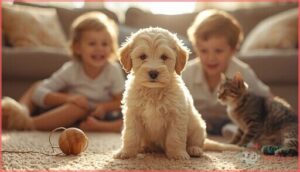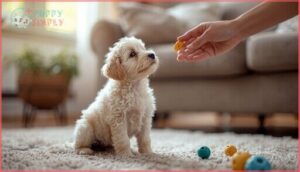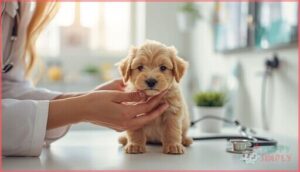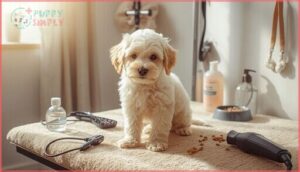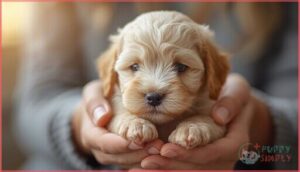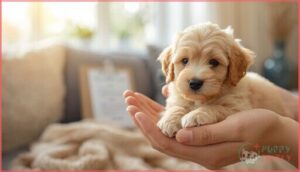This site is supported by our readers. We may earn a commission, at no cost to you, if you purchase through links.
Your neighbor’s new puppy fits inside her purse, has a coat that looks like it belongs on a stuffed animal, and—here’s the kicker—barely sheds a hair on her black couch. That’s the teacup goldendoodle summed up: a pint-sized crossbreed that packs the smarts of a poodle and the warmth of a golden retriever into a package that weighs less than most house cats.
These pocket-sized companions have become the poster dogs for apartment living and compact spaces, but their adorable exterior comes with some serious considerations. From fragile bones that can’t handle rough play to dental issues that pop up faster than you’d expect, breeding dogs this small means amplifying certain health risks you won’t find in their larger cousins.
Before you fall for those big eyes and teddy-bear face, you’ll want the full picture on what life with one of these mini marvels really looks like.
Table Of Contents
- Key Takeaways
- What is a Teacup Goldendoodle?
- Teacup Goldendoodle Size and Appearance
- Personality and Temperament Traits
- Training and Socialization Tips
- Common Health Concerns
- Care, Grooming, and Daily Needs
- Is a Teacup Goldendoodle Right for You?
- Choosing a Teacup Goldendoodle Responsibly
- Frequently Asked Questions (FAQs)
- What is the average lifespan of a Teacup Goldendoodle?
- How much exercise does a Teacup Goldendoodle need?
- Are Teacup Goldendoodles hypoallergenic?
- Are Teacup Goldendoodles good for first-time owners?
- Are Teacup Goldendoodles easy to potty train?
- Can Teacup Goldendoodles swim safely?
- Do they bark more than larger breeds?
- How do they handle cold weather climates?
- What travel considerations exist for Teacup Goldendoodles?
- Conclusion
Key Takeaways
- Teacup Goldendoodles are tiny, low-shedding mixes of poodle and golden retriever, but their delicate bones and dental issues mean they need extra gentle care and frequent vet visits.
- Their affectionate, playful personalities make them great companions for adults and older kids, but these pups aren’t suited for rough play or homes with toddlers.
- Responsible ownership means choosing ethical breeders who provide health screenings, avoiding puppy mills, and budgeting for ongoing grooming and medical costs.
- While they fit well in apartments and small spaces, these dogs need daily exercise, mental stimulation, and lots of attention to stay happy and healthy.
What is a Teacup Goldendoodle?
A Teacup Goldendoodle is the tiniest version of the Golden Retriever-Poodle mix, generally weighing under 15 pounds and standing less than 15 inches tall. These pocket-sized pups pack all the warmth and intelligence of their larger cousins into a seriously compact package, making them incredibly popular despite some ongoing debates about breeding ethics.
Before you fall head over heels for one, it helps to understand exactly what sets them apart from other Goldendoodle sizes and why they’ve earned that “teacup” nickname.
Teacup Vs. Toy Vs. Mini Goldendoodles
Size comparisons among Goldendoodles can feel confusing, but here’s what you need to know. Teacup Goldendoodles and Toy Goldendoodles are basically the same—both weigh 10 to 25 pounds and stand under 15 inches tall. Mini Goldendoodles are larger at 25 to 50 pounds and 15 to 20 inches.
These breed standards matter for Teacup Goldendoodle care, as smaller sizes often carry greater health risks requiring careful genetic testing. Ensuring the validity of scientific study summaries, such as those on methodological rigor, is vital for making informed decisions about animal health.
Goldendoodle Generations Explained
Now, about Goldendoodle Generations—think of F1 Goldendoodle as the classic mix, while F1B Goldendoodle has extra Poodle influence for curlier coat variations and less shedding. For apartment dwellers training either generation, puppy training pads designed for smaller spaces pair perfectly with consistent verbal cues and immediate rewards to build reliable habits quickly.
Responsible breeding ethics mean you should always ask for genetic testing and health screenings.
Each generation type affects traits, so knowing your Teacup Goldendoodle’s lineage helps you anticipate health and personality quirks.
Why Are They Called “Teacup”?
The label “teacup” comes from Marketing Tactics that compare your pup’s adult weight to something you could cradle in a literal cup—though no formal Miniature Standards exist for this ultra-tiny Size Classification. Here’s what drives the Nomenclature Origins:
- Breeding Practices using Toy Poodles create these pint-sized companions.
- Breeders aim for dogs under ten pounds.
- “Teacup” isn’t regulated by any official registry.
- It distinguishes these from Mini Goldendoodles or standard varieties.
- The term appeals to buyers wanting portable pets.
Remember, smaller doesn’t always mean healthier—ask your vet before falling for the hype. For other common snack questions like whether poodles can safely enjoy peanut butter, always check ingredients and portion sizes with your vet first.
Teacup Goldendoodle Size and Appearance
One of the first things people ask about Teacup Goldendoodles is just how tiny they actually are—and whether that adorable little face comes with a poodle’s curls or something closer to a Golden Retriever’s flow. The truth is, their size and coat can vary more than you’d think, depending on their generation and genetics. Before you fall for those tiny features, it’s worth exploring what makes teacup breeds unique and whether their petite size aligns with your lifestyle and expectations.
Let’s break down what you can realistically expect regarding weight, height, coat texture, and those trendy haircut styles that keep them looking their best. Many teacup breeds also face serious dental and health challenges that owners should understand before committing to grooming routines.
Typical Weight and Height
When you’re looking at these pint-sized pups, you’ll find most adults tip the scales somewhere between 5 and 10 pounds—that’s lighter than many house cats. Height ranges usually stay under 12 inches at the shoulder, making them genuinely pocket-sized compared to their Mini Goldendoodle and Standard Goldendoodle cousins.
| Weight Class | Typical Weight | Typical Height |
|---|---|---|
| Smallest teacup | Under 5 lbs | 8–9 inches |
| Lower range | 5–7 lbs | 9–10 inches |
| Mid-range | 7–9 lbs | 10–11 inches |
| Upper limit | 9–11 lbs | 11–12 inches |
| Standard comparison | 50–90 lbs | 20–26 inches |
Size variance in Teacup Goldendoodles is wide because breeding practices differ wildly. Growth patterns depend on lineage, generation status, and even diet. Body proportions matter too—some small breed dogs stay compact and sturdy, while others grow lankier. Weight factors like activity level and metabolism play into your pup’s final build, so don’t expect cookie-cutter consistency across every teacup litter.
Common Coat Types and Colors
Coat texture in Teacup Goldendoodles ranges from wavy to curly, thanks to their Poodle lineage—and that’s what makes them popular as low-shedding dog breeds. You’ll see color genetics produce cream, apricot, chocolate, black, and parti patterns most often.
While breeders sometimes advertise them as hypoallergenic dog breeds, no coat is 100% allergen-free. Shedding patterns vary by generation, but most maintain that sought-after hypoallergenic coat with proper grooming. For a detailed breakdown of temperament, energy levels, and which breed fits your lifestyle, check out this Labradoodle vs Goldendoodle comparison.
Teacup Goldendoodle Haircuts
You’ve got several haircut styles to choose from when grooming your Teacup Goldendoodle. The teddy bear cut creates that plush-toy look with rounded facial features, while puppy cuts keep maintenance simple with uniform lengths across their hypoallergenic coat.
For low-shedding dog breeds like yours, lion cuts reduce matting by leaving a neck mane but clipping the body, and show cuts add dramatic flair with longer fringe against shorter body fur.
Personality and Temperament Traits
Teacup Goldendoodles pack a lot of personality into their tiny frames, and understanding their temperament helps you know what life with one really looks like. These pint-sized pups inherit traits from both Golden Retrievers and Poodles, which means you’re getting a smart, affectionate dog that thrives on human connection.
Let’s break down how they fit into family life, interact with kids and other pets, and what their daily energy and social needs actually look like.
Family Compatibility
Teacup Goldendoodles thrive as family pets when everyone commits to gentle handling and consistent routines. Their friendly, affectionate temperament makes them wonderful companion animals for households seeking intelligent breeds that bond deeply with people.
Proper socialization during puppyhood creates strong family dynamics. However, their delicate size means you need to prioritize household safety—especially teaching kids calm interaction techniques that protect these family-friendly pets from accidental injury.
Behavior With Children and Pets
When your Teacup Goldendoodle meets children or other pets, supervised introductions become essential safety precautions—these tiny dogs can’t handle rough play. Teach kids gentle child interaction habits: no sudden movements, no picking up without permission.
Early socialization techniques during puppyhood shape confident canine temperament around family dynamics. Most Goldendoodles show friendly dog behavior and socialization toward household animals when you prioritize gradual pet introductions and positive experiences with your family pets.
Energy Levels and Social Needs
Despite their pocket size, your Teacup Goldendoodle packs surprising energy—usually needing 60 to 90 minutes of daily exercise spread across short bursts. Understanding their canine temperament helps you meet these playtime needs:
- Energy patterns: High activity spurts followed by extended rest
- Social bonding: Strong attachment requiring frequent human interaction
- Mental stimulation: Puzzle toys and training sessions prevent boredom
- Small dog care: Avoid overexertion in extreme temperatures
Regular dog behavior and socialization opportunities keep your Goldendoodle balanced and content.
Training and Socialization Tips
Training a Teacup Goldendoodle isn’t just about teaching commands—it’s about building confidence in a tiny dog maneuvering a giant world. These pint-sized pups are smart and keen to please, but their small stature comes with unique challenges you’ll need to address early on.
Let’s walk through the essentials that’ll help your little companion grow into a well-adjusted, happy dog.
Potty Training Small Dogs
Potty training small dogs like Teacup Goldendoodles requires more patience than you’d think. Their tiny bladders mean frequent trips—every 2–3 hours during the day. Crate training helps prevent accidents when you can’t supervise, but the crate shouldn’t feel like punishment.
| Strategy | Why It Works |
|---|---|
| Fixed outdoor spot | Builds location memory through scent cues |
| Consistent cue word | Reinforces elimination on command |
| Immediate rewards | Strengthens positive associations |
| Track elimination times | Reveals patterns for better timing |
Watch for sniffing or circling—these signal it’s time to head outside. Skip the puppy pads; they confuse small breeds about where elimination belongs. Clean accidents with enzymatic cleaners to remove odor triggers completely.
Small breed challenges include shorter warning times and weather sensitivity. Your consistency matters more than anything—skipping routines on weekends can reset weeks of progress. If accidents suddenly increase after successful housebreaking, schedule a vet check to rule out health issues.
Positive Reinforcement Methods
Once your Teacup Goldendoodle understands where elimination belongs, reward systems become your strongest training ally. Clicker training marks exact behaviors—follow each click with a high-value treat for best results.
Verbal praise works beautifully when paired with food rewards, while social rewards like gentle play reinforce calm behavior.
Keep sessions under ten minutes; small dog training demands consistency, not marathon drills.
Preventing Separation Anxiety
Small breeds bond intensely with their people, which makes alone-time preparation just as important as crate training. Start departures at two minutes, then stretch to five, ten, and beyond—gradual exposure prevents panic before it starts.
Anxiety triggers often include grabbing keys or putting on shoes, so practice these cues without leaving to desensitize your pup.
- Provide puzzle feeders and chew toys to redirect focus during your absence
- Use white noise or soft music to mask startling sounds from outside
- Reward calm behavior when you return, not excited greetings that reinforce stress
- Schedule pre-departure exercise to burn off restless energy and promote relaxation
Common Health Concerns
Like any small breed, Teacup Goldendoodles come with their own set of health challenges that you’ll want to keep on your radar. Their tiny size makes them vulnerable to specific dental and joint issues that larger dogs rarely face.
Let’s walk through the main health concerns you should discuss with your vet before bringing one of these little companions home.
Dental and Orthopedic Problems
Tiny jaws bring big dental care challenges—teacup Goldendoodles often develop gum disease and tooth crowding by age three.
Their delicate frames also face orthopedic issues like wobbly kneecaps and back strain. Regular vet visits catch joint problems early, but veterinary costs add up fast.
Smart owners invest in pet insurance to handle small dog health surprises without breaking the bank.
Lifespan and Veterinary Care Needs
Beyond those dental bills, your teacup Goldendoodle can live 10 to 12 years with proper Goldendoodle care. Health screenings twice yearly catch Goldendoodle health issues early—blood work, heartworm tests, and eye exams matter most.
Veterinary costs climb as they age, so senior care includes nutrition advice customized to their tiny frames. Disease prevention and dog health and wellness routines protect canine health through every life stage.
Care, Grooming, and Daily Needs
Taking care of a Teacup Goldendoodle isn’t rocket science, but these tiny companions do need consistent attention to stay healthy and happy. From their adorable curly coats to their surprisingly energetic personalities, you’ll want to cover all the basics. Let’s break down what your pint-sized pup needs regarding exercise, grooming, and feeding.
Exercise and Playtime Requirements
Your Teacup Goldendoodle needs 20 to 30 minutes of daily exercise to stay happy and healthy—think short walks paired with indoor play like fetch or puzzle toys. Mental stimulation matters just as much as physical activity, so mix things up to prevent boredom. Here’s how to structure their day:
- Break exercise into 2–3 short sessions instead of one marathon playtime
- Watch for signs of fatigue like heavy panting or slowing down
- Use lightweight toys and gentle games to protect those tiny joints
Grooming Frequency and Techniques
You’ll want to brush your Teacup Goldendoodle’s wavy coat 2–3 times weekly using a slicker brush and fine-tooth comb—this prevents matting before it starts. Schedule professional grooming every 6–8 weeks to maintain coat health and manage shedding control. Between sessions, check ears monthly and trim nails as needed.
These grooming tools and brushing techniques keep your low-shedding companion comfortable year-round. Regular language learning with dictionary search tools can also help you better understand breed descriptions and care instructions.
Diet and Nutrition Tips
Quality protein intake drives your Teacup Goldendoodle’s health—aim for 22–30 grams per 5 kg of body weight daily from animal sources. Caloric needs run about 90–120 kcal per kilogram, split across 2–3 measured meals to prevent weight gain.
Include omega fatty acids for skin health in low-shedding dog breeds, choose complex carbs for steady energy, and keep fresh water available constantly.
Nutrient balance and hydration tips form the foundation of responsible pet ownership for hypoallergenic dogs.
Is a Teacup Goldendoodle Right for You?
Before you fall head over heels for those adorable puppy-dog eyes, let’s talk reality checks. Teacup Goldendoodles aren’t for everyone—they come with specific needs that match certain lifestyles better than others.
Here’s what you need to think about whether this tiny companion fits your world.
Ideal Owners and Lifestyles
You’ll do best with a Teacup Goldendoodle if you’re home often and can handle their higher care needs. These pint-sized pups thrive with adults or families who have older kids, since their delicate frames don’t mix well with rough play.
Daily walks, mental games, and regular vet visits are non-negotiable. If you love predictable routines and gentle companionship in a smaller space, this breed might be your perfect match.
Who Should Avoid Teacup Goldendoodles
If you’re juggling severe dog allergies, a Teacup Goldendoodle probably won’t work—even low-shedding coats still produce dander. Young families with toddlers risk accidental injury to these fragile pups. Owners stretched thin on time may struggle with their high maintenance grooming, daily socialization needs, and separation anxiety.
Small space alone isn’t the issue—it’s whether you can commit to responsible dog ownership despite their special needs.
Apartment and Urban Living Suitability
Your Teacup Goldendoodle can thrive in apartment living if you’re committed to their daily needs. These low-shedding dog breeds adapt well to small spaces, but they need at least 60 minutes of exercise—think indoor play and quick neighborhood walks.
Urban noise can startle them, so gradual exposure helps. City dogs like these make great apartment pets when you prioritize mental stimulation and consistent outdoor time.
Choosing a Teacup Goldendoodle Responsibly
Getting a Teacup Goldendoodle isn’t something you want to rush into without doing your homework. The landscape of tiny dogs can be a minefield of unethical breeders who prioritize profit over the well-being of these little pups.
Let’s walk through what you need to know to bring home a healthy, responsibly-bred Teacup Goldendoodle.
Ethical Breeding and Adoption
When you’re bringing home a Teacup Goldendoodle, you’re not just choosing a pet—you’re taking a stand for animal welfare. Responsible ownership starts with breeder accountability and adoption ethics that put dogs first, not profit.
Choosing a Teacup Goldendoodle means prioritizing animal welfare by supporting ethical breeders and responsible adoption practices over profit
- Avoid puppy mills that prioritize quantity over quality and health
- Verify welfare standards through health screenings and transparent records
- Consider rescue adoption to give deserving dogs a second chance
- Research dog breeding ethics before committing to any source
Responsible breeding means genetic testing, proper socialization, and ongoing veterinary care that protects these tiny pups from preventable suffering.
How to Find a Responsible Breeder
Once you’ve committed to responsible breeding, your next move is finding someone who walks the talk. Start with Breeder Accreditation—look for OFA clearances and documented health testing on parent dogs. Request puppy contracts that guarantee lifetime support and spay/neuter agreements. Ask for references, tour facilities, and verify their adoption process reflects genuine breeding ethics, not just profit margins.
| What to Check | Red Flags | Green Flags |
|---|---|---|
| Health Testing | No documentation or vague answers | OFA/ACVIM clearances provided upfront |
| Facility Access | Refuses visits or video tours | Welcomes inspection, clean conditions |
| References | Can’t provide buyer contacts | Multiple verifiable, happy families |
Typical Price Range and What to Expect
Once you’ve vetted your breeder, expect Teacup Goldendoodles to run $1,000 to $3,000, with top-line genetics pushing past $4,000. Breeder fees reflect health testing and reputation, while adoption costs from rescues stay under $1,500.
Factor in lifetime expenses—vet visits, grooming, and emergencies—when budgeting for these low-shedding dogs.
Price factors matter, but ethical dog breeding and long-term pet ownership costs matter more.
Frequently Asked Questions (FAQs)
What is the average lifespan of a Teacup Goldendoodle?
Most small doodle crosses live around 12 to 15 years, though genetics, preventive care, and dental health play huge roles in your Teacup Goldendoodle’s actual lifespan and quality of life.
How much exercise does a Teacup Goldendoodle need?
Don’t let their pint-sized frame fool you—these pups still crave action.
Teacup Goldendoodles need 20 to 40 minutes of daily walks, playtime tips like fetch, and mental stimulation through puzzle toys to stay happy.
Are Teacup Goldendoodles hypoallergenic?
No dog is truly hypoallergenic. Teacup Goldendoodles may shed less than other breeds, but they still produce allergens in dander and saliva.
Spend time with individual dogs before committing if you have allergies.
Are Teacup Goldendoodles good for first-time owners?
They can work for beginners willing to commit to consistent pet care, puppy socialization, and small dog ownership challenges—but first-time owners need patience with grooming, dog training tips, and fragility concerns unique to teacup breeds.
Are Teacup Goldendoodles easy to potty train?
Training a pint-sized pup means bathroom breaks every hour or two—those tiny bladders can’t wait.
With consistent schedules and treat-based rewards, most Teacup Goldendoodles master housebreaking methods within four to six weeks of practice.
Can Teacup Goldendoodles swim safely?
Yes, with proper supervision and gradual introductions. Their Poodle ancestry gives them natural swimming ability, but always use Dog Life Jackets for safety.
Start with shallow water and positive reinforcement during Swimming Lessons.
Do they bark more than larger breeds?
Bark frequency in small breeds often depends more on training and environment than size alone.
Teacup Goldendoodles don’t inherently vocalize more than larger dogs—socialization and positive reinforcement shape their noise levels markedly.
How do they handle cold weather climates?
Despite their fluffy charm, these pint-sized pups struggle in frigid temperatures. Their minimal body mass and low-shedding coat offer little insulation, making hypothermia risks and frostbite prevention essential winter care priorities for responsible Teacup Goldendoodle owners.
What travel considerations exist for Teacup Goldendoodles?
Air travel with small dogs requires cabin-friendly carriers and health certificates.
Secure car safety restraints prevent injury during trips.
Always pack pet insurance documentation, travel documents, and familiar comfort items for stress-free journeys.
Conclusion
A teacup goldendoodle can be the perfect match for your lifestyle—or a mismatch you’ll regret within months. These dogs thrive when you’ve got realistic expectations about their fragility, grooming demands, and need for companionship.
If you’re ready to invest time in training, regular vet visits, and gentle handling, you’ll gain a loyal companion who fits snugly into smaller spaces. Just remember: cuteness doesn’t cancel out responsibility, and informed decisions always beat impulse buys.
- https://www.crockettdoodles.com/health-guarantee/
- https://wildearth.com/blogs/dog-knowledge/teacup-goldendoodle-breed-guide
- https://blog.tryfi.com/full-grown-mini-goldendoodle/
- https://www.dogster.com/dog-breeds/mini-goldendoodle-pros-cons
- https://academichelpexpress.blog/2024/08/please-use-the-bulleted-points-and-the-rubric-below-to-guide-your-work-your-pa/


